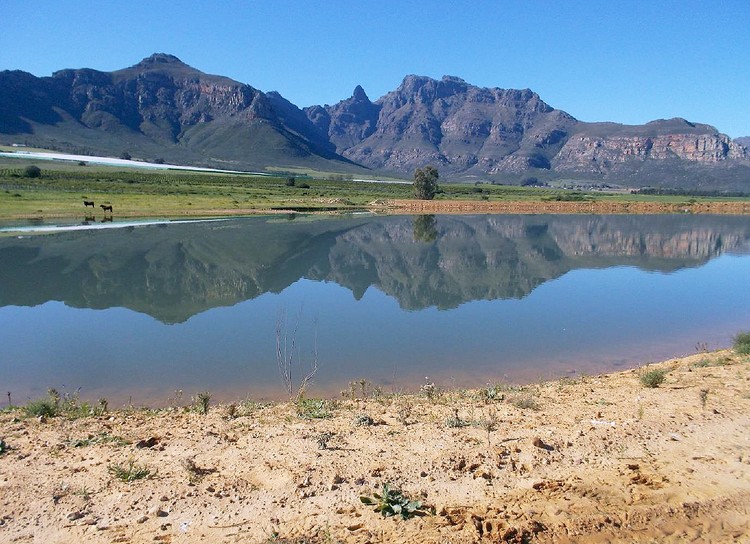
30 July 2024
A picture of the illegal Namaquasfontein School Dam, as used in a 2020 freshwater specialist study of the dam. Photo: BlueScience consultancy
A Piketberg agricultural co-operative which increased the size of a farm dam by nearly 50 times without environmental approval, wants its fine cut from R625,000 to R100,000.
The administrative fine was imposed on Piekenierskloof Vrugte for increasing the size of the Namaquasfontein School Dam in 2017 without prior environmental approval. The co-op increased the size of the dam from about 1,000 cubic metres to 47,000 cubic metres, with an embankment wall 6.2 metres high.
Piekenierskloof Vrugte has agreed it is liable for a fine but has appealed against the amount, arguing that the bigger dam will not cause any significant environmental damage.
The fine was issued in June by the Western Cape government’s Department of Environmental Affairs and Development Planning as part of a so-called “Section 24G” application by the co-op to obtain approval for the illegal enlargement of the dam on property that it leases in the Moutonshoek valley near Redelinghuys.
Section 24G of the National Environmental Management Act of 1998 (NEMA) applies to the unlawful start of any “listed activities” – such as clearing indigenous vegetation, altering water courses, or altering natural or cultural landscapes – that would, or could, result in adverse environmental impacts, before obtaining environmental authorisation. It provides for the effective condonation and rectification of such illegal actions through a formal application process. An administrative fine of up to R5-million for a company or R2.5-million for an individual must be imposed by the relevant environmental authority before an environmental approval application can be adjudicated.
The fine does not mean that the Section 24G application will be approved, and the applicant can be subject to criminal charges under NEMA that carry fines of up R10-million and/or lengthy jail terms.
Apart from the dam, the co-op also wants condonation of a 1.8km pipeline and other water infrastructure at the Krom Antonies River which flows through the property. This river is one of four rivers feeding Verlorenvlei. Verlorenvlei is a crucial water source for west coast communities and a globally significant biodiversity wetland system.
The size of fines like this is determined by a fines administrator using a calculator developed by the national Department of Forestry, Fisheries and the Environment factoring in socio-economic impact, biodiversity impact, pollution impact and “sense of place” or heritage impact.
Imposing the fine, the administrator found that although the bigger dam would not mean the co-op would extract more water than it was currently allowed, and no additional water would be taken from the Krom Antonies River, the enlargement of the dam would have biodiversity impacts.
Represented by Cape Town law firm BBS Attorneys, Piekenierskloof Vrugte lodged a 16-page appeal asking for the fine to be reduced to a maximum of R100,000.
The co-op argued there would be positive socio-economic impacts and said the construction of the dam extension had been undertaken on the advice of a professional dam engineer, now deceased, who had said it would be lawful. The dam had been enlarged “in the mistaken belief that there was no legal impediment to doing so … that the activity was being lawfully undertaken”, Pikenierskloof Vrugte said, arguing that the absence of “evil” intent should justify a decrease in the fine.
The appeal authority is Western Cape environment MEC Anton Bredell.